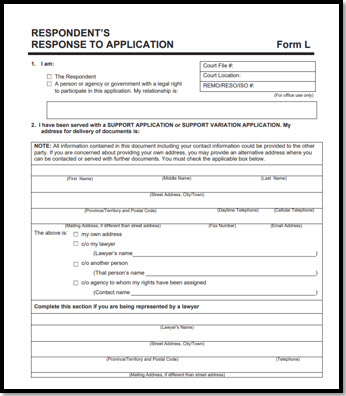Updated May 2021
When spouses or parents live in different provinces or countries they must follow special procedures to get or change child support and spousal support orders. A recent eNews article explained how to apply for or change a support order, or apply to cancel or reduce support arrears, when the other party lives outside BC.
This eNews deals with the procedure when someone in BC receives notice of a support-related application made outside the province – procedure established by the Interjurisdictional Support Orders Act (sometimes called ISO).
So, what can you expect if you have received (“been served with”) an application by a person who lives outside the province to obtain or change a support order?

Paperwork
You will have received a summons to attend Provincial Court on a certain date and time, along with a copy of the court forms completed by the applicant (the person who is seeking a court order). You will also have received a form called Respondent’s Response to Application. You must fill out this form to say whether you agree or disagree with the application, and file this form at the court registry within the time limit given.
Your summons package will also include contact information for the Interjurisdictional Support Services (IJSS). The IJSS office cannot provide legal advice, but they can give you information about:
• the ISO process
• the Child Support Guidelines that will apply
• legal resources for people in BC
Before completing the form, it is wise to talk to a lawyer and get legal advice. You may also wish to have a lawyer attend court with you.
You may also be required to complete a financial statement form to describe your financial circumstances, even if you agree with the application. When filing a financial statement form, you should also file supporting information such as tax returns, pay stubs or income statements, bank statements, credit card statements and any other information that shows your financial circumstances. See Financial Documents for Family Court for lists of helpful information you might include.
If you disagree with the application for support, you may be required to fill out and file other forms listed in the Respondent’s Response to Application form. This may include forms where you can set out your position about the amount of support or expenses the applicant is claiming.
You will need to file the original forms and three copies of each document in the court registry.
Court hearing
The court will set a date for you to attend court and notify you of that date. If you disagree with the application the court will reserve time for a hearing when you can testify and present evidence about facts you and the applicant disagree on, and about your financial circumstances.
The Attorney General of BC may also send a lawyer to court to appear as an ”amicus curiae”, which is a Latin term meaning “friend of the court”. This lawyer does not represent any particular party but is at court to provide information to the judge about the application and the Interjurisdictional Support Orders Act process. The other party will normally not attend the hearing.
It is very important to respond to the application. If you do not file a response to the application or if you do not attend court, the judge can issue a warrant for your arrest - the judge can also make an order that you pay support in your absence and without hearing from you.
At the end of the hearing, the judge may make an order for support. The judge might also order that you or the applicant provide more information, in which case the hearing will be continued on another day. Depending on the circumstances, the judge may also refuse to make any order.
More information
See our recent eNews How do you get or change a support order when the other party lives outside BC?
Find more information about the ISO process and IJSS office at: https://www.isoforms.bc.ca/frequently-asked-questions/

